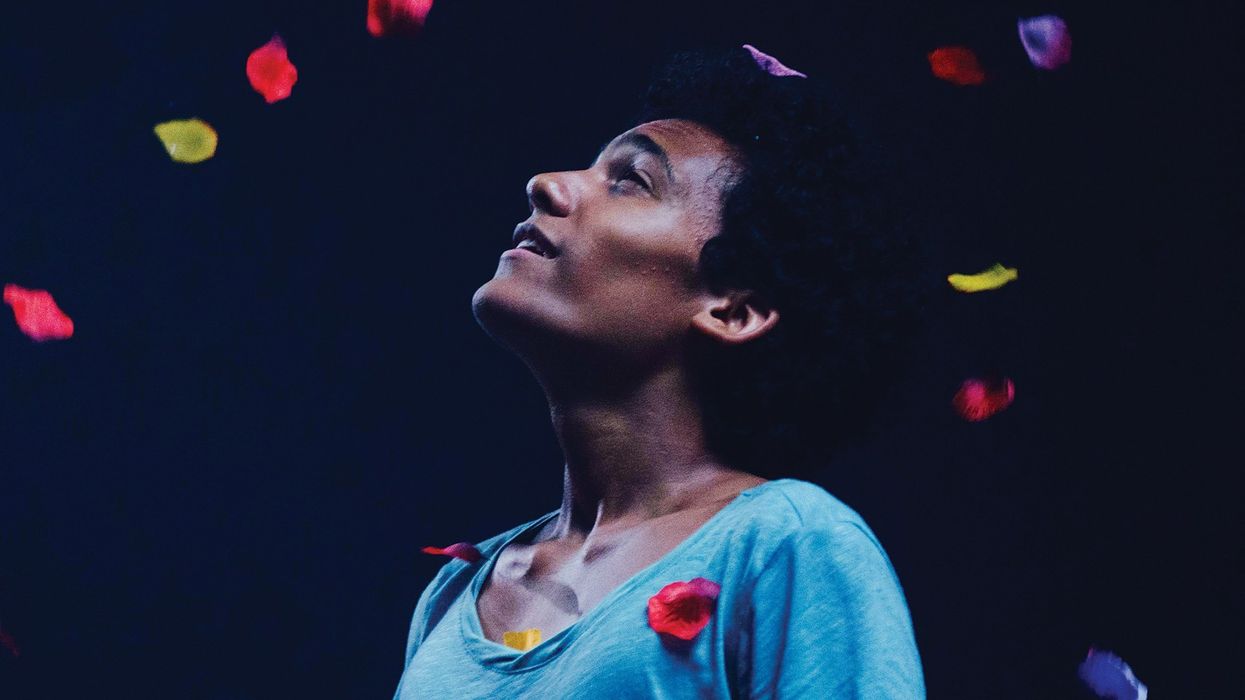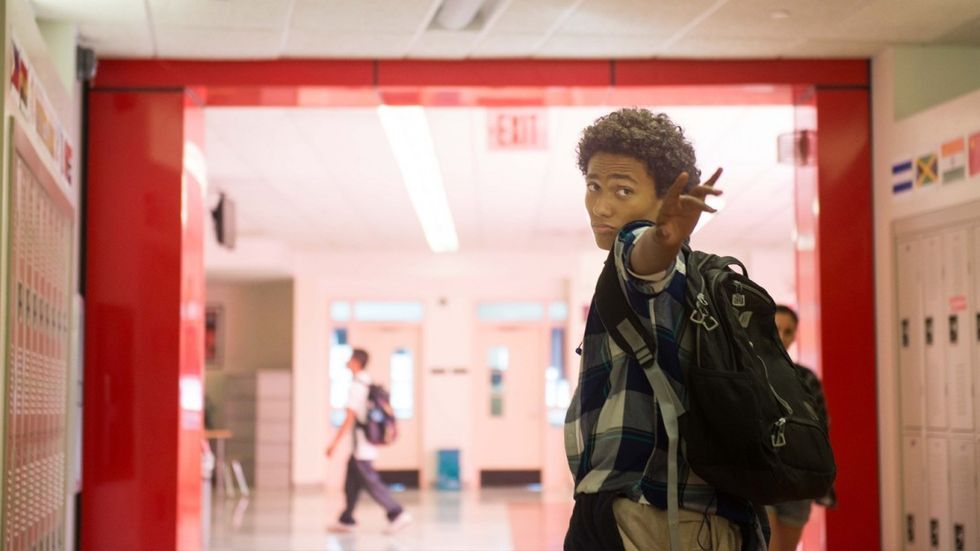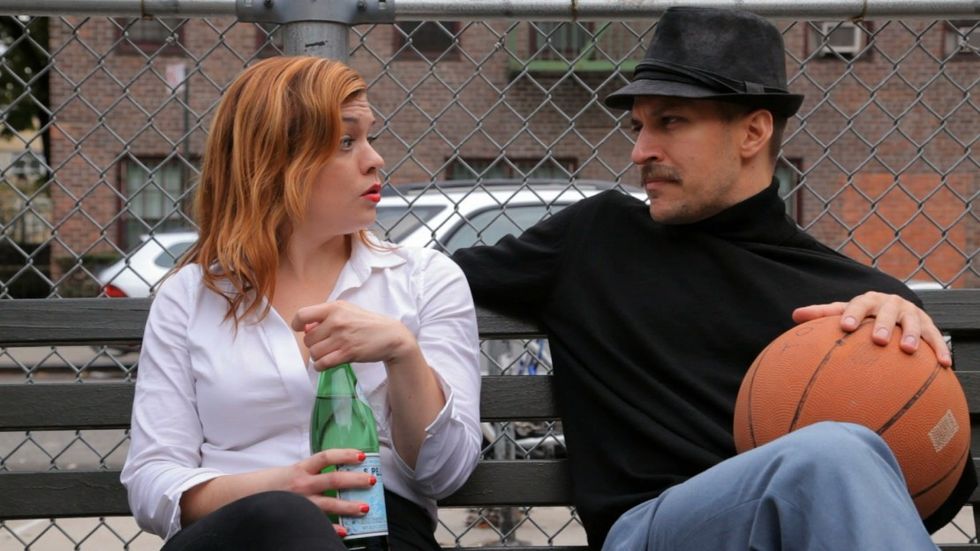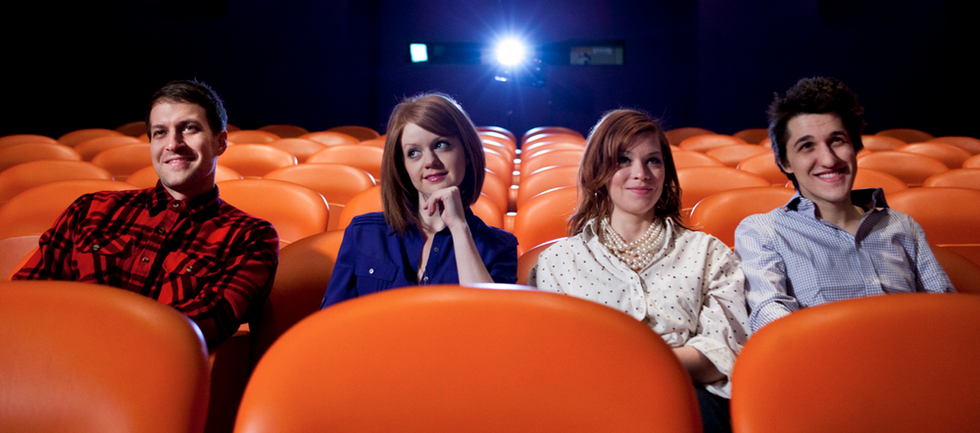'Saturday Church': The Movie That Everyone's Calling 'Moonlight' Meets 'La La Land'
Director Damon Cardasis' non-traditional path to filmmaking included planning bar mitzvahs for Susan Sarandon's ping pong club.

In the wake of the most recent award season, it's not hard to see why the trades are calling Saturday Church a Moonlightmeets La La Land mashup. But while Damon Cardasis' first feature is similar on the surface—it is an all-African-American LGBTQ musical after all—Saturday Church rings with originality and a scrappy independent spirit. And nobody saves jazz here.
The film follows a teenage boy named Ulysses who finds himself adrift after the passing of his father. When Ulysses' brother catches him wearing their mother's stockings, he is forced to discuss his sexuality with a conservative family that can't bear any more turbulence amid their grief. In search of a more accepting place, Ulysses stumbles upon the Saturday Church program for outcast youth, and eventually, upon the power of voguing. Saturday Church is a subtle and surprisingly joyous look at a rarely portrayed NYC subculture.
Cardasis came to directing on a winding path, and he told No Film School a little about the roots of his career in a recent interview following Saturday Church's 2017 Tribeca Film Festival premiere. The first thing to know, he said, is that he didn't go to film school. Instead, he went to NYU for acting.
"It felt to me like a now or never moment."
After graduation, Cardasis spent time on fruitless auditions, waiting tables, and a brief stint at ICM. It quickly became clear this wasn't the right path. A break came when he landed a job in the notorious role of Scott Rudin's assistant. He followed the assisting path briefly, also working on Rebecca Miller's The Private Lives of Pippa Lee, but that wasn't clicking either.
When Pippa Lee was finished, Cardasis made a bold decision. He put his film career on pause. "When I was Rebecca's assistant she'd always said, 'If you want to write, write. You just have to start.' It felt to me like a now or never moment," Cardasis told NFS. He spent the next three years waiting tables and devoting his free time to writing.
Eventually, Cardasis left food service and started planning events for Susan Sarandon's ping pong club SPIN, all the while continuing to work hard on his side hustle. Cardasis recalled how, in his free time, he managed to turn a small sketch into a three month NYC theater run, and then turn that run into the web series that won him two WGA awards. Cardasis also started the Lower East Side Film Festival during this time. "We felt like there was no festival that really focuses on people that make films for no money, so we put 30 fold out chairs into the storefront and had a pulldown screen, and thus LESFF was born," he said.
After all of this hard work, Cardasis made the official leap back into film when he and Miller founded Round Films. And that script he was working on? It became Saturday Church.

No Film School: It sounds to me like the key to your success has been about being open to any and all experiences.
Damon Cardasis: Yes. Mixed with a lot of hard work. Not to pat myself on the back, but anyone who's waiting for a handout is going to be in for a rude awakening. I was not born in this industry. My mother's a priest, my father's a teacher. I did not come with any sort of connections. And anyone I met was through interning, being an assistant, and taking on jobs and working my ass off, so that they'd refer me to somebody else. But also, you're right, being open. So many people think there's one strict path.
Went I went back to waiting tables after Scott Rudin, I could've gotten a job at a studio instead, which is great and some people want that, but I also knew that wasn't my path. And when I went back to waiting tables, a lot of the kids I knew who were assistants, who were moving up to become coordinators and creative execs, they thought I was kind of crazy. Like I was really blowing up an opportunity. And in fact, I waited on some of their tables. But, I just knew I had to be true to what my gut was telling me even though logically it was extremely risky.
"I was not born in this industry. My mother's a priest, my father's a teacher."
NFS: So your gut brought you to this story, too?
Cardasis: So I found out about the Saturday Church program through my mother. I liked the program and I thought it was amazing that the church was taking care of these kids who had in many cases been cast out of their homes due to religion—it was two sides of that religious coin. And also seeing the kids go to the gymnasium [at the program], and dance and be so free and empowered. And even more so going to a ball and seeing how creative and talented everybody was, making these beautiful costumes for $15. I was just so blown away by it.
Once the inspiration bug hits, you can't deny it. For me it hit where it needed to. So that's how Saturday Church came about, and we put it together from there. I wasn't sure if I was going to direct it or not, but one of the producers said, 'I'm not producing this unless you direct it.'
NFS: Why was that?
Cardasis: I think she just knew I was so close to the material, it was so in my bones, and also I think she just knew that I could do it. I wasn't afraid of it. So I said okay. Not in a cocky way, I just wasn't afraid of being front and center.

NFS: Did you feel like you were better equipped to make a more complex first feature because you had all this producing experience?
Cardasis: Maybe in some ways. It's weird, the experience of the director is totally different. And I think I was a little bit blindsided by that. I was like, 'I've produced, I know the stakes, I know what the lingo is.' But I did not know the emotional intensity. It's very different.
It was hard at times to separate when I was a producer and when I was a director. In other ways it was very much a positive because I knew what the producers were trying to do. I knew that if they said, 'this page count's too high,' it wasn't because they were attacking my creative soul, it was a numbers thing. Even my editor (Abbi Jutkowitz) was like, 'I've never seen a writer/director be so ruthless with their own material in the editing room.' Oddly my brain would like switch over and I could look at it as a producer and make cuts, and then I would switch back to being a director and think about how they affected the story.
Now that I'm producing Rebecca's two other films, I totally get what she's going through. I can empathize so much more.
NFS: That's interesting, so directing helped you as a producer...
Cardasis: For sure.
NFS: Why was it important to you to include the musical component in the film?
Cardasis: Because of the two rooms at that Saturday Church program; the cafeteria and the gymnasium where they would dance. I knew I wanted an escapism element and something fantastical to happen, which is where the flowers come in at moments. I love the idea that [the main character, Ulysses] has this bleak reality but he pulls small strands of beauty from life. So there was the passion that came from the voguing, and I also liked the idea of music being something that he and his father shared.
With musical numbers though, they're one of those things where there's never enough time. We shot some of those musical numbers in like four hours with one camera, which is insane, most people do that over two days with like 10 cameras.
NFS: Can you give me an example?
Cardasis: Oh, like every one. Luka [Kain] was 16 when we shot it, and due to federal labor laws we only had nine hours a day with him. And we couldn't go into overtime—when he was off, he was off.
NFS: So how did you prep for that?
Cardasis: You just kind of wing it. You get on set and you figure it out, and then the dancers come and they say, 'oh we've been rehearsing in a room which was totally different.' And you just deal with it. So no, there was no real prep. It was flying by the seat of our pants. That is the best way to describe it.
NFS: That moment is really wonderful because up until then, unless you've read about it, you don't know that it's going to be a musical and then all of a sudden this surreal thing starts happening.
Cardasis: Thank you. Yeah, I wanted it to be a little like you're settling in for a quiet, nice, maybe a little familiar, LGBTQ coming of age story, and then all of a sudden it's a bit of a 180. I wanted the first one to be that surprise. There's a little trace of music, to cue the people really paying attention, and there's a subtle magical moment with the flower petals falling. I think most people watching would just think, 'oh he touched the tree branch and flowers fell,' but if you notice, the tree has no flowers on it.
NFS: Writing it, how did you feel out when it was time for a musical number?
Cardasis: Again it was definitely a gut thing. I knew it needed to be there...but I didn't want it to be for the sake of having a musical number. It had to help further the story.
"Anytime the first thing out of someone's mouth is something negative, your response should be, 'I can do it, and go f*ck yourself.'"
NFS: Did you do any emotional prep to get in the role of director?
Cardasis: Not really. I think it helped that I was an actor and knew how to talk to the actors. I was a little bit intimated by it at first, but then I started talking to the actors and I was like, 'oh I know how to do this.' It's almost like a language you forgot you knew.
And then with the crew, I had strong opinions but I was also open to suggestions. And I tried to be as decisive as possible because I knew we didn't have time. There was one day where we weren't going to get everything in and it was the last day at this location. We rewrote the scene and gutted a whole portion of it. You just have to be quick on your feet, but without drama. I don't like frenetic energy. I hate people that panic. It's just not a trait that is helpful on a movie. It's like you're going to battle and you don't want the general freaking out. So unless someone's arm just got chopped off, calm the f*ck down. There were definitely moments when I was stressed, but there's enough drama going on by virtue of shooting a movie, it's not going to help anybody to show it.
NFS: I'm wondering how you felt when you saw that Moonlight won the Oscar.
Cardasis: I love Moonlight, I think it's amazing. I'd written the script three years ago and we shot it in the summer. So I'd already shot and started editing my film when I saw Moonlight. I was definitely was like, 'oh my god.' It's funny because everybody's like, 'it's Moonlight meets La La Land' and I just had no idea, I was done with editing by the time I even saw La La Land. I get the comparisons, though.
Listen, I think Moonlight's an amazing movie and it helped open the door for other material. It helped people think, 'well I wouldn't normally look at this kind of material but I did see that Moonlight film and that was amazing, so yeah I'd go see another movie with this subject matter.' If it helped pave the way for more diverse stories, then all I can do is thank Moonlight. You know, thank Moonlight anyway because it was my favorite movie of the year.

NFS: Do you have any advice for other people making their first feature?
Cardasis: My advice first of all would be to do something that you're passionate about. Sometimes people feel like a subject material is "in", or they can market it well. But if you're not passionate about the material, don't do it.
And don't listen the naysayers. Everyone has an opinion. I remember when I told a friend of mine that I wanted to do a web series and the first thing out of his mouth was, 'oooh, another web series.' And if I had listened to him, I would never have been nominated for WGA awards, so any time the first thing out of someone's mouth is something negative, your response should be, 'I can do it, and go f*ck yourself.' You need to surround yourself with supportive people. There are enough problems as it is, you don't need someone with toxic energy holding you down.
For more, see our complete coverage of the 2017 Tribeca Film Festival.












